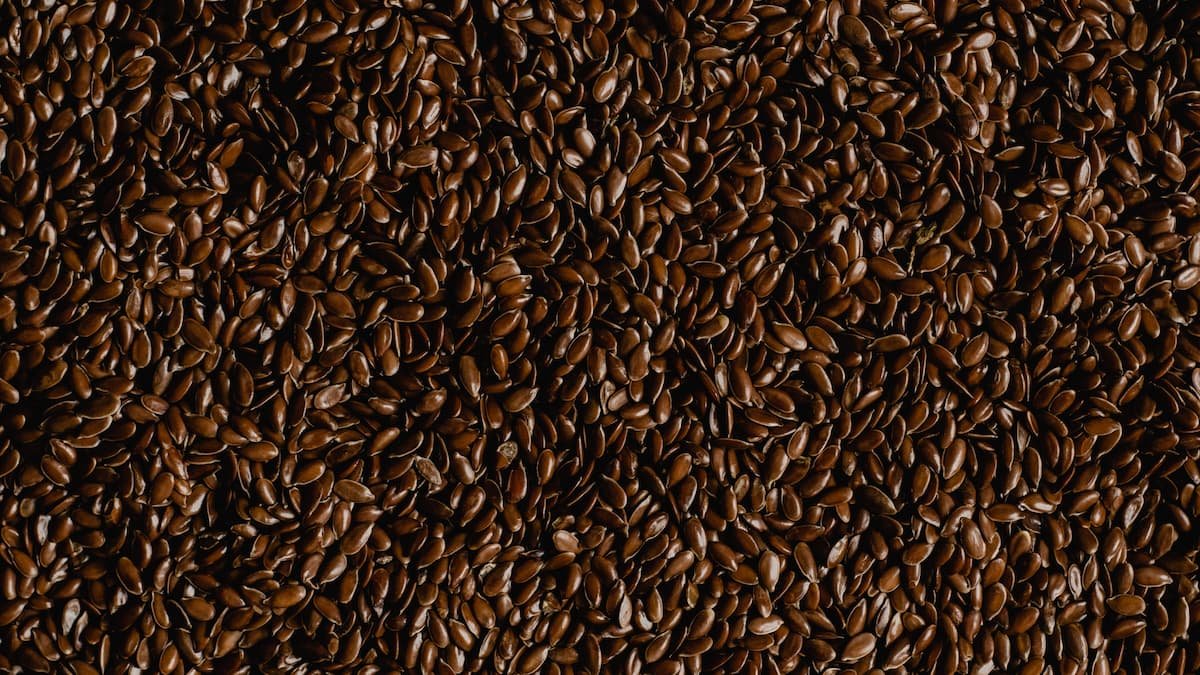Introduction
The Nutrition Facts of the Flaxseed make it a wonder food. Moreover, it is functional food like Amla and Dates. Also, a hundred grams of seed contains nearly 500 kilocalories, 42 grams of fat, 28 grams of fiber, and 20 grams of Protein. Besides, it is rich in alpha-linolenic acid, an omega-3 fatty acid. However, these are good fats and beneficial to a healthy heart. Also, it contains a good amount of dietary fiber and good quality protein.
Flaxseed Nutrition Facts
| Name | Value | Unit |
|---|---|---|
| Water | 6.96 | gram |
| Energy in kcal | 534 | kcal |
| Energy in kJ | 2230 | kJ |
| Protein | 18.30 | g |
| Total Lipid | 42.20 | g |
| Ash | 3.72 | g |
| Carbohydrate | 28.9 | g |
| Total Dietary Fiber | 27.3 | g |
| Total Sugars | 1.15 | g |
| Calcium | 255 | mg |
| Iron | 5.73 | mg |
| Magnesium | 392 | mg |
| Phosphorus | 642 | mg |
| Potassium | 813 | mg |
| Sodium | 30 | mg |
| Zinc | 4.3 | mg |
| Copper | 1.22 | mg |
| Manganese | 2.48 | mg |
| Selenium | 25.4 | µg (microgram) |
| Vitamin C | 0.6 | mg |
| Thiamin | 1.64 | mg |
| Riboflavin | 0.161 | mg |
| Niacin | 3.08 | mg |
| Pantothenic acid | 0.985 | mg |
| Vitamin B-6 | 0.473 | mg |
| Total Folate | 87 | µg |
| Total Choline | 78.7 | mg |
| Betaine | 3.1 | mg |
| Lutein + zeaxanthin | 651 | µg |
| Vitamin E (alpha-tocopherol) | 0.31 | mg |
| gamma-tocopherol | 20 | mg |
| delta-tocopherol | 0.35 | 0.35 |
| Vitamin K (phylloquinone) | 4.3 | µg |
| Total Saturated Fatty Acids | 3.66 | g |
| Total Monounsaturated Fatty Acids | 7.53 | g |
| Total Polyunsaturated Fatty Acids | 28.7 | g |
Overview of Flaxseed Nutrition Facts
We can call Flaxseed a potential functional food because it is a very good source of alpha-linolenic acid, high-quality protein, Lignans, a high amount of dietary fiber, and other phenolic compounds.
Now, let us elucidate every aspect of these nutrients in detail.
Alpha-linolenic acid
Alpha-linolenic acid (ALA) is an essential Omega-3 fatty acid. It becomes essential because the body cannot produce/synthesize on its own. Moreover, Flaxseed is the only plant source that contains Alpha-linolenic acid (Riediger et al., 2009). Also, there are three types of Omega-3 fatty acids (Linolenic acid, eicosapentaenoic acid (EPA), and docosahexaenoic acid (DHA)). Above all, Many studies conclude that all three types of acids are beneficial to heart health.
Also, ALA from Flaxseed exerts positive effects on blood lipids. Additionally, a study by Chan et al., 1993 suggests that ALA reduces the plasma total cholesterol, LDL(Low-Density Lipoprotein, and VLDL (Very Low-Density Lipoprotein) cholesterol in 20-34 years old healthy men.
Besides, ground flaxseed, high in omega-3 fatty acids, reduces hypertension, cholesterol, and triglyceride level (Oomah and Maza, 1998).
Also, the presence of ALA in adipose tissue reduces the risk of certain cancers. (Maillard et al., 2002).
Based on the results of clinical trials, epidemiological investigations and experimental studies, ingestion of ALA has been suggested to have a positive impact on Cardiovascular Vascular Disease (CVD). Because of its high ALA content, the use of flaxseed has been advocated to combat CVD.
The cardiovascular effects of flaxseed and its omega-3 fatty acid, alpha-linolenic acid
Additionally, there have been hundreds of medical studies that suggest the beneficial effects of Flaxseed on heart health.
Lignans
Lignans contribute to most of the benefits of Flaxseed.
Moreover, Lignans are the phytoestrogens available in legumes and other plant sources. Flaxseed contains about 75- 800 times more Lignans than cereal grains, legumes, fruits, and vegetables. Hence, It is the richest source of Lignans.
Besides, the antioxidant activity of the Lignans contributes to the anti-cancer functions of Flaxseed.
Also, Dietary flaxseed has the potential to reduce tumor growth in patients with certain hormone-dependent cancers. (Lilian U. Thompson, May-2005)
Furthermore, Mammalian Lignans suppress the growth of prostate cancer cells. (Switzer BR et al, 2001).
Similarly, Lignans help balance estrogen levels in the body. Also, they have been found to help reduce menopause symptoms, similar to soy phytoestrogens.
Dietary Fiber
Flaxseed contains soluble and insoluble dietary fibers. Nearly 25% of your fiber needs can be obtained from a half-ounce of dry whole flaxseed.
Besides, Dietary fibers from flaxseed help in body weight regulation through both hunger suppression and diminished nutrient absorption. Besides, it slows down the emptying of the stomach and lowers blood glucose levels. Also, it lowers Cholesterol by inhibiting its absorption.
Moreover, it reduces the postprandial blood glucose response in humans. Hence, Fiber in Flaxseed plays an important role in lowering blood glucose levels. Also, it is helpful in preventing obesity.
Protein
Flaxseed contains nearly 20% protein of its total weight. Besides, the amino acid pattern is similar to that of soybean protein. Hence, it is one of the most nutritious plant proteins. Moreover, Albumin and globulin type proteins are the major proteins in flaxseed.
Besides, the protein of flaxseed is more effective in reducing plasma cholesterol and triglyceride levels than soya protein. Moreover, it is gluten-free.
Moreover, Velasquez et al, 2003, had found that Flaxseed protein is more effective than soy protein in reducing proteinuria and renal histologic abnormalities. Hence, it has a renal protective effect.
Besides, it has strong immunosuppressive and antimalarial activities by inhibiting malarial parasites. Also, it has antihypertensive properties.
Flaxseed Anti-Nutrients
Apart from beneficial Nutrition facts, Flaxseed contains anti-nutrients also. I give below the important anti-nutrients.
Cyanogenic Glycosides
Cyanogenic Glycoside is a questionable compound found in flaxseed. However, the acute toxic dose of the inorganic cyanide for an adult is 50-60 mg. Also, humans can detoxify it if it is below 30-100 mg. However, 1-2 tablespoons of Flaxseed can contain 5-10 mg of hydrogen cyanide. Moreover, roasting of flaxseed can eliminate Cyanogenic Glycoside. Hence it is always advisable to roast the flaxseed before consumption. Also, two-phase solvent extraction with hexane and alkanol can detoxify it.
Linatine
Linatine is an antipyridoxine factor (a Vitamin B6 antagonist) found in flaxseed. However, Linatine is a problem in chicks, flaxseed has not been associated with a vitamin B6 deficiency in humans.
Trypsin Inhibitor and Phytic Acid
Additionally, Flaxseed contains trypsin inhibitors and phytic acid. Nonetheless, they are lower than Soya and Canola seeds. The activity of the components is insignificant and has a lesser impact on human health.
Conclusion
The Flaxseed seed is a complete food that helps in conditions like hypertension, heart disease, diabetes, constipation, many types of cancers, and many more diseases. In spite of many health benefits, it also contains some anti-nutrients. However, most of the risks posed by these anti-nutrients can be overcome by consuming the roasted form of seed. Moreover, the benefits definitely overweigh the risks. Hence, including flaxseed in your daily diet will provide you with better health.




